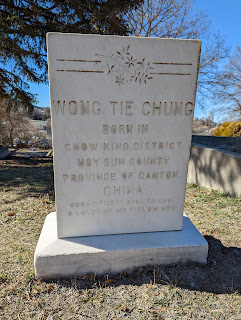An Untold History
The histories of Chinese immigrants during the Exclusion Era (1882-1943) that moved to other areas outside urban centers on the American West Coast such as San Francisco, Portland, or Seattle are largely unknown. Until recently, much of the Chinese immigrant story in rural areas, especially in Oregon, has gone undocumented or remains marginalized at best. Accounts have acknowledged their presence in incidental ways rather than intentional in historical accounts.
Chinese people were among those who immigrated to and settled in the early days of Klamath Falls, OR. Unlike many other growing Oregon communities in the late nineteenth and early twentieth centuries, Klamath Falls did not host the mining, railroad, and fishing industries that regularly drew Chinese immigrants to towns across the state.
The town was, however, one of the fastest growing in Oregon during that era, with the railroad arriving in 1909.1 Such growth afforded opportunities in the service industries, such as laundries and store-keeping, that were a draw for Chinese immigrants.
 |
| 1907 Sanborn Fire Map shows Chinese businesses in downtown Klamath Falls. |
During the first phase of Chinese immigration to the American West from 1849-1882, one man who is considered a Klamath Falls pioneer, Wong Tai Chung, was among them. Born in Canton China around 1850 or 1854, he made his way to Klamath Falls via Yreka, CA.
The story of Wong Tai Chung given here is only a minimal chronicling of the life he lived and the impact he had on the citizens and community of early Klamath Falls. Because of his immigrant status and Chinese ethnicity, there are no birth or ship voyage records to rely on to pinpoint his moving from China to his debarkation point, or anywhere that he may have lived before coming to Klamath Falls.
The best we can do is look at the signs of his presence through the sources available. One only needs to look at the headstone in the Linkville Cemetery to see that he was a man of importance in the Klamath Falls community.
Businessman & Community Member
The first glimpse of Wong Tai Chung in Klamath Falls is found in a newspaper article from 1918 that tells of his visiting a friend, the manager of the Oregon California Power Company. We can guess that he liked what he saw of Klamath Falls, because he is listed in the 1920 U.S. Census report as being 66 years old, married, and a cook for Ryan Construction Company.
Because the Page Act of 1875 prohibited the majority of Asian women entering America, Wong Tai Chung's wife was likely left behind in China. These laws aimed to discourage Asians from permanently living in America.
 |
| 1920 U.S. Census, Wong Tai Chung highlighted in yellow, at bottom of green section. |
Wong Tai Chung continued to fare well with life in Klamath Falls. At some point in the early 1920s, he entered partnership with a fellow Chinese man, Henry On, becoming co-owner of Tin Hin Guey Restaurant (Chop Suey Restaurant/Oriental Cafe), located at 619 Main St. The storefront still stands there today.
In April 1924, Wong sold his partnership; it is not known who this partnership was sold to, but it is likely that this restaurant was in operation from approximately 1922 until at least 1930 under a variety of Chinese owner- and partnerships. Incidentally, the original building still stands at 619 Main St.
 |
| Chop Suey Restaurant, c. 1920s. |
A year later in 1925, Wong, or “Old Charley Wong” as he was commonly known, was recovering from a “serious illness” at the Klamath General Hospital, according to newspaper accounts. The local newspaper credited him as being “one of the last of the old Klamath residents who saw Klamath grow from old Linkville” to the current town of Klamath Falls.
Wong Tai Chung recovered, and continued on with his partnership in the restaurant and other work in the community.
Last Days & Death
In late October 1930, Wong Tai Chung became ill and spent nearly a month in the hospital before passing away on November 25, 1930 as reported in The Evening Herald newspaper. On the day before his death, Wong signed over a warranty deed to a lot, and half-interest in another, to Wong Lee Hong who lived in Klamath Falls.
This indicates that Wong not only had previous business partnerships in the community, but he also owned interest in property. The conveyance of his property is extraordinary, because Oregon, like California, had adopted an Alien Land Law in 1923 that forbade Asian immigrants from buying or leasing land.
 |
| The Evening Herald, Tues. Nov. 25, 1930. |
Friends were invited to attend Wong Tai Chung's funeral services at Whitlock Funeral Home, with interment taking place at the Linkville Cemetery, according to the news article. Joseph Ewing, pastor at St. Paul’s Episcopal Church officiated the service.
An Eternal Community Member
Wong Tai Chung still rests in the Linkville Cemetery, and his headstone is one of the largest and most intact on the property. It is unknown who paid for the marker, if other Chinese in the community contributed, or if Wong paid for it himself.
It is a comforting thought that the Chinese Consolidated Benevolent Association, the organization responsible for repatriating the remains of Chinese immigrants back to their ancestral country, felt that Wong Tai Chung was where he needed to be. It is also comforting to know that this well-liked man will remain an eternal member of the Klamath Falls Community.
 |
| Headstone as it stands today in Linkville Cemetery. |
Wong Tai Chung's headstone in the Linkville Cemetery Reads:
